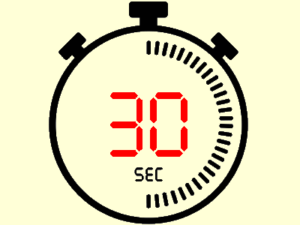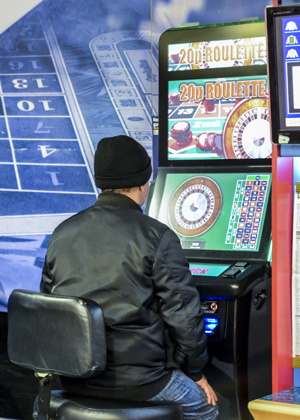AI 30 Second Lock-Out System Installed In Gambling Machines To Allow Users To Cool Off
 Two things have dominated press coverage of the gambling industry in recent years: problem gambling and Fixed Odds Betting Terminals. In many ways the reasons why they’ve both been so talked about are linked, with FOBTs once being referred to as the ‘crack cocaine of gambling‘ thanks to their ability to allow punters to bet as much as £100 per spin until the government decided to reduce their maximum stake.
Two things have dominated press coverage of the gambling industry in recent years: problem gambling and Fixed Odds Betting Terminals. In many ways the reasons why they’ve both been so talked about are linked, with FOBTs once being referred to as the ‘crack cocaine of gambling‘ thanks to their ability to allow punters to bet as much as £100 per spin until the government decided to reduce their maximum stake.
That curb was designed to reduce the use of the machines by problem gamblers and has made such a difference to betting companies’ profits that they’ve had to close stores as a result. Yet things haven’t stopped there in the story of FOBTs, with news emerging that they have now had new Artificial Intelligence software installed into them that is designed to recognise and then prevent problem gamblers from losing too much money by locking them out of the system for a short period.
How The Artificial Intelligence System Works
 The Artificial Intelligence being installed on betting machines is designed to be able to identify excessive or erratic play. Labelled as the Anonymous Player Awareness System, it will constantly analyse the player’s behaviour whilst they are using a betting machine. It uses an algorithm that can spot if players do any of the following:
The Artificial Intelligence being installed on betting machines is designed to be able to identify excessive or erratic play. Labelled as the Anonymous Player Awareness System, it will constantly analyse the player’s behaviour whilst they are using a betting machine. It uses an algorithm that can spot if players do any of the following:
- Chase losses
- Speed up betting when losing
- Play erratically
- Spend too long on one of the machines
The algorithm is able to keep track of a range of factors whilst people are using the machines, determining when someone is at risk of gambling harm and acting accordingly. Because of the factors that the AI system looks for, there is no specific moment when it will be triggered. Each person using gambling machines will have a different playing style and the APAS will therefore react specifically to each player.
What Happens When It’s Triggered
 Knowing that the Anonymous Player Awareness System will kick in if it identifies erratic or troublesome play from a user of a Fixed Odds Betting Terminal is all well and good, but what will the system actually do in such an instant? The first thing that will happen is that the user will be locked out of being able to play for 30 seconds, which is being used as a so-called ‘cooling off’ period.
Knowing that the Anonymous Player Awareness System will kick in if it identifies erratic or troublesome play from a user of a Fixed Odds Betting Terminal is all well and good, but what will the system actually do in such an instant? The first thing that will happen is that the user will be locked out of being able to play for 30 seconds, which is being used as a so-called ‘cooling off’ period.
Once the cooling off period is in effect the screen will be filled with messages about safe gambling, reminding players to ensure they’re spending within their means. At the same time, staff working in the betting shops will be alerted that the warning has been triggered, giving them a chance to have a discussion with the player to see if there’s anything that they can do to help. The player will be advised to set limits on the money that they can spend during play.
Where The System Has Been Installed
Having previously bee talled on machines for players who have got personal accounts and who will log in before playing, APAS has now been rolled out to all Fixed Odds Betting Terminals and aimed at anyone who uses them. They have been installed in thousands of shops owned by companies such as William Hill, Ladbrokes and Coral.
talled on machines for players who have got personal accounts and who will log in before playing, APAS has now been rolled out to all Fixed Odds Betting Terminals and aimed at anyone who uses them. They have been installed in thousands of shops owned by companies such as William Hill, Ladbrokes and Coral.
The system will take previous problem behaviour into account for players that have chosen to login to use the machines, though it obviously can’t do in the case of people who choose to play anonymously. It has been launched by the Betting and Gaming Council, which represents around 90% of the industry and it is therefore safe to assume that around that same percentage of machines will have the software on board.
Whilst it is limited to use on the machines found in betting shops initially, it is likely that the Anonymous Player Awareness System will be rolled out to other machines in the near future. This could include the likes of casino slot machines and machines in pubs that have the ability to display such messages. If it proves to be successful then the betting industry would struggle to find excuses not to roll it out. The only question is whether it will be or not.
Is A 30 Second Break Long Enough?
 Dr Alan Smith, who is the Bishop of St. Albans and a long time anti-gambling campaigner, has questioned whether either 20 or 30 second breaks are long enough and has asked for an independent academic review to be launched in order to investigate the effectiveness of such a short ‘cooling off’ period. He said that it puts the onus of responsibility ‘on the consumer and not on the industry’, which he believes is a major problem.
Dr Alan Smith, who is the Bishop of St. Albans and a long time anti-gambling campaigner, has questioned whether either 20 or 30 second breaks are long enough and has asked for an independent academic review to be launched in order to investigate the effectiveness of such a short ‘cooling off’ period. He said that it puts the onus of responsibility ‘on the consumer and not on the industry’, which he believes is a major problem.
Dr Smith also pointed out that it is interesting that industry chiefs appear to be expending a lot of energy in fighting against an increase in regulation for any of their remote operations, but at the same time they’re ‘trumpeting their efforts on the high street’. He believes that by offering this fig leaf they’re opening the way to allow them to ‘create and then promote addictive gambling products’.
If Dr Smith was looking for evidence to back up his theory that a 30 second break isn’t long enough then he might want to look towards a study carried out in Norway. In it users of the country’s video lottery terminals were studied when a 90 second ‘session termination’ was forced on them and the conclusion was that there was ‘no significant effect of the forced termination’ in regards to how much money the user chose to spend on the machine.
What People Are Saying About It
 Professor of Behavioural Addiction at Nottingham Trent University, Mark Griffiths, believes that this is, at the very least, a ‘step in the right direction’. He feels that things will need to be ‘monitored and evaluated’ as time passes to see if it’s made any real difference. He also said that the mandatory break being put in place is ‘probably not long enough to have a positive effect’, which is inline with the findings of the Norwegian study.
Professor of Behavioural Addiction at Nottingham Trent University, Mark Griffiths, believes that this is, at the very least, a ‘step in the right direction’. He feels that things will need to be ‘monitored and evaluated’ as time passes to see if it’s made any real difference. He also said that the mandatory break being put in place is ‘probably not long enough to have a positive effect’, which is inline with the findings of the Norwegian study.
The interim Chief Executive of the Betting and Gaming Council, Wes Himes, believes that this is an ‘opportunity to champion the highest standards and share best practice on safe betting and gaming’. He said that he feels that it is a sign of the intent of the betting and gambling industry to improve things for problems gamblers, saying, “I’m convinced that this approach can help restore public trust and I look forward to working on further betting and gaming initiatives across the industry”.
Himes was also quick to point out that it is usually the staff members working in the bookmakers that end up paying the price for ‘decisions made in boardrooms’. He said, “The violence associated with these machines is a worrying trend and I hope this will not lead to a degradation in worker’s experiences”. He said that if it was done incorrectly then an impact would ‘certainly be felt in the lives of over-stretched, and often poorly paid, staff in bookies’.



